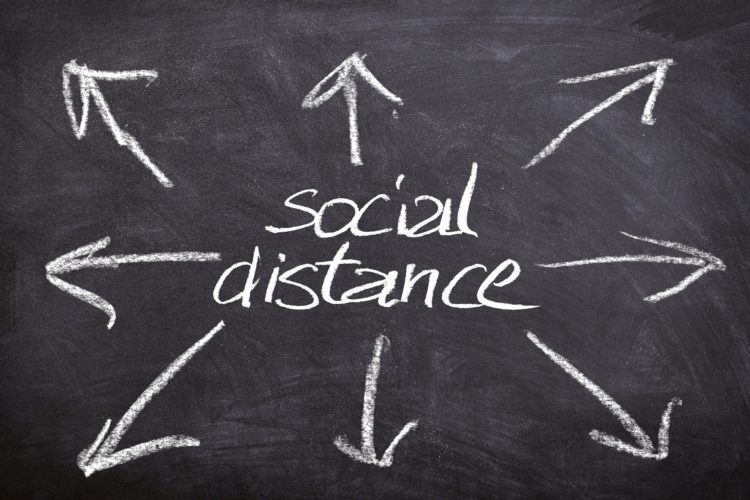BY MICHAEL SOZE
Boner author Jan Großer and his view on the Corona crisis.
In our postmodern times, as elsewhere, expert opinions stand against proven bullshit, personal sensitivities against factual reality. It is the time of populist agitators as well as religious fanatics and self-appointed guardians of language and meaning. Vague fears, long-cherished prejudices, feelings of loneliness and personal inadequacy, hatred, agitation and magical thinking condense on this virus.

It may be coincidence, but it is precisely the crises of the people I consider to be my family that accentuate themselves: the religiously inspired self-hatred of my best friend, the flare-up of cancer in my long-time girlfriend, the partnership crises in my „family circle“, the destructive Chemsex crash of an acquaintance, the desperation of his partner, the threatening feelings of loneliness and solitude in an hour when being alone with others provided relief.
Comparisons are in order. For many gays who are partnerless or live in sexless relationships, contact barriers mean extensive sexual abstinence. Corona is thus already the second pandemic virus that restricts the sexual freedom of gay men.

Some people are already saying that the recommendations of the government or DAH are „sex-hostile“. There are complaints about the „moralising“ of some, more or less offensively expressing the view that the personal feelings of some people should take a back seat to the common good and that sex dates or sex parties are irresponsible. Insult and indignation follow on the other side; fronts harden and compassion once again falls by the wayside.

At this point it is important to take a differentiated view and discuss. Corona is not HIV; the contact ban affects all people, especially those who suffer from loneliness or are vulnerable. Elderly people, singles, the already marginalized, sex workers, people with addictions, etc.
Unlike HIV, now everyone is in the same boat, heterosexuals like homos and other sexual minorities, sexually active as well as abstinent people. Every infected person poses a threat to others, to fellow men, sex partners, friends, but also to the health personnel. Every infected person competes with others for scarce hospital beds. The behaviour of individuals can have consequences for everyone.

A current argument revolves around the resurgence of an outdated „sexual morality“. As a gay community, we are back on familiar ground. In the past centuries, it has always been gay men who have been a symbol of vice, perversion and sexual transgression. The gay sex culture has confidently and lustfully adopted these attributions and made them its distinguishing feature, always in opposition to a heteronormative or even „bourgeois“ mainstream.

But does this mainstream still exist? Apart from people who are thoughtless or ignorant anyway, aren’t outright homophobes a minority? I have to admit that I have been fucking and fisting my way through world history for 32 years without ever feeling restricted by any real or perceived homophobia of others.
This does not mean that gay men are not persecuted and denigrated, especially if they belong to other minorities. But who in Western Europe is really restricted in living out their sex dreams, however wild they may be?

To conjure up old patterns of oppression and persecution in the Corona crisis rather distracts attention from a much weightier dilemma, namely how gay men deal with their now legally protected freedom. Whether I live in intimate monogamy or set up my life as a hedonistic amusement park is ultimately my decision. Nobody forbids it to me, and nobody will take responsibility for its consequences from me.
It is no longer about rigid „sexual morals“, but simply about ethics, the responsibility to weigh up one’s own behaviour with the consequences above all for others and for society and the environment as a whole, as is otherwise the case in life.
At this point our own conflicts come to light. I know what to do, but I find it difficult or even impossible to do it. We gays have made the unconditional expression of our sexual needs a central point of our existence and community; I am no exception. We try to satisfy our desires for bonding, closeness and belonging, escape from everyday life, self-definition, fun and recognition through sex, even if many fail because of it.

Depression and loneliness, harmful substance consumption or professional difficulties are still understood as the failures of individuals and not as the systemic failure of a sex culture that does not satisfy many needs but simply numbs them. Whoever relies only on this one horse to realize his happiness in life will get into trouble in the Corona crisis. Nor is it about rigid standards of behaviour; neither substance consumption, parties, GrindR, or sexual adventure are per se bad or good, just as little as monogamy or abstinence.

But at the point where they even stand in the way of fulfilling our needs for existential security, health, work ability, affection and belonging, they become a problem. In this crisis, however, it is not only about ourselves, but also about our sex partners, life partners and even people we do not even know. In this respect, these other people may now express opinions about our personal sex and contact behaviour; why not?
You are directly or indirectly affected by the consequences of this behaviour. They may choose a language and words that reveal a lack of compassion or politeness, even express prejudice and resentment, but this alone does not allow us to escape our responsibility for our behaviour and its consequences
If it is so difficult to keep your cock or ass in your pants for a month or two, it is not because a temporary withdrawal from sex is „life-threatening“, but because many of us no longer have an alternative to satisfy our emotional needs for security, closeness or recognition in any other way.

The experts tell us how to behave; almost none of us have the knowledge to question their recommendations. But many of us will find it difficult to follow them. Rather than going out into the world and blaming and recriminating others for our very own conflicts, we should think about how we can help each other to do the right thing now, knowing that we are all afraid, whether of infection or of being alone.
In our vulnerability and inconsistency, we are all just people. Hopefully, we’ll remember that after Corona.
Author Jan Großer:
Jan Großer is a specialist in psychiatry with a specialisation in addictions and a particular interest in sexual therapy. After 12 years of professional activity in London, he has been living in Berlin again since 2010, where he is involved as a volunteer in the gay counselling team and as a Chemsex activist.











